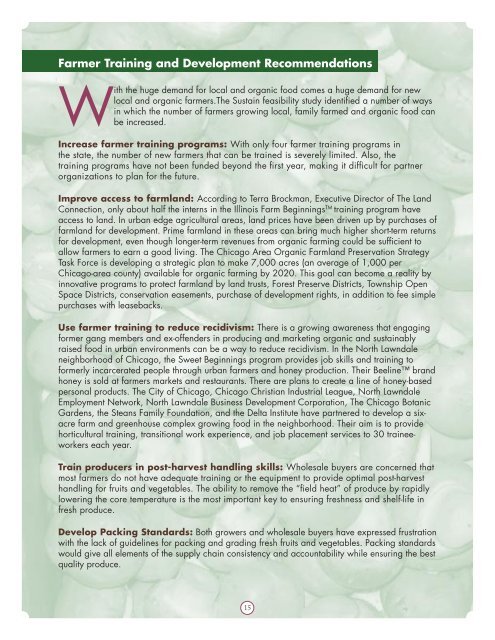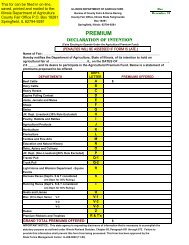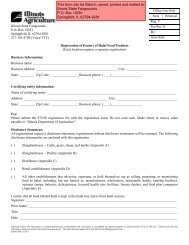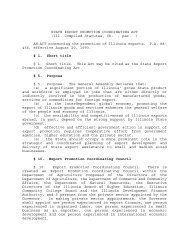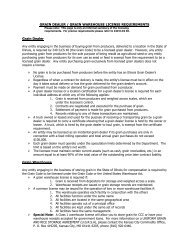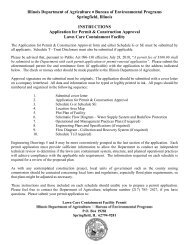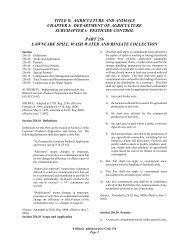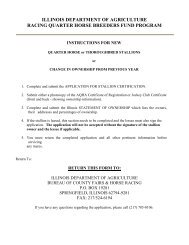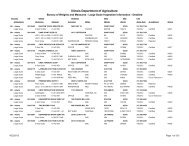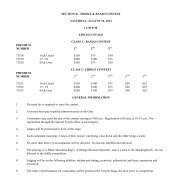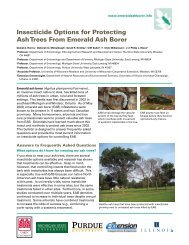Organic Harvest Report - Illinois Department of Agriculture
Organic Harvest Report - Illinois Department of Agriculture
Organic Harvest Report - Illinois Department of Agriculture
Create successful ePaper yourself
Turn your PDF publications into a flip-book with our unique Google optimized e-Paper software.
Farmer Training and Development Recommendations<br />
With the huge demand for local and organic food comes a huge demand for new<br />
local and organic farmers.The Sustain feasibility study identified a number <strong>of</strong> ways<br />
in which the number <strong>of</strong> farmers growing local, family farmed and organic food can<br />
be increased.<br />
Increase farmer training programs: With only four farmer training programs in<br />
the state, the number <strong>of</strong> new farmers that can be trained is severely limited. Also, the<br />
training programs have not been funded beyond the first year, making it difficult for partner<br />
organizations to plan for the future.<br />
Improve access to farmland: According to Terra Brockman, Executive Director <strong>of</strong> The Land<br />
Connection, only about half the interns in the <strong>Illinois</strong> Farm Beginnings TM training program have<br />
access to land. In urban edge agricultural areas, land prices have been driven up by purchases <strong>of</strong><br />
farmland for development. Prime farmland in these areas can bring much higher short-term returns<br />
for development, even though longer-term revenues from organic farming could be sufficient to<br />
allow farmers to earn a good living. The Chicago Area <strong>Organic</strong> Farmland Preservation Strategy<br />
Task Force is developing a strategic plan to make 7,000 acres (an average <strong>of</strong> 1,000 per<br />
Chicago-area county) available for organic farming by 2020. This goal can become a reality by<br />
innovative programs to protect farmland by land trusts, Forest Preserve Districts, Township Open<br />
Space Districts, conservation easements, purchase <strong>of</strong> development rights, in addition to fee simple<br />
purchases with leasebacks.<br />
Use farmer training to reduce recidivism: There is a growing awareness that engaging<br />
former gang members and ex-<strong>of</strong>fenders in producing and marketing organic and sustainably<br />
raised food in urban environments can be a way to reduce recidivism. In the North Lawndale<br />
neighborhood <strong>of</strong> Chicago, the Sweet Beginnings program provides job skills and training to<br />
formerly incarcerated people through urban farmers and honey production. Their Beeline brand<br />
honey is sold at farmers markets and restaurants. There are plans to create a line <strong>of</strong> honey-based<br />
personal products. The City <strong>of</strong> Chicago, Chicago Christian Industrial League, North Lawndale<br />
Employment Network, North Lawndale Business Development Corporation, The Chicago Botanic<br />
Gardens, the Steans Family Foundation, and the Delta Institute have partnered to develop a sixacre<br />
farm and greenhouse complex growing food in the neighborhood. Their aim is to provide<br />
horticultural training, transitional work experience, and job placement services to 30 traineeworkers<br />
each year.<br />
Train producers in post-harvest handling skills: Wholesale buyers are concerned that<br />
most farmers do not have adequate training or the equipment to provide optimal post-harvest<br />
handling for fruits and vegetables. The ability to remove the “field heat” <strong>of</strong> produce by rapidly<br />
lowering the core temperature is the most important key to ensuring freshness and shelf-life in<br />
fresh produce.<br />
Develop Packing Standards: Both growers and wholesale buyers have expressed frustration<br />
with the lack <strong>of</strong> guidelines for packing and grading fresh fruits and vegetables. Packing standards<br />
would give all elements <strong>of</strong> the supply chain consistency and accountability while ensuring the best<br />
quality produce.<br />
15


